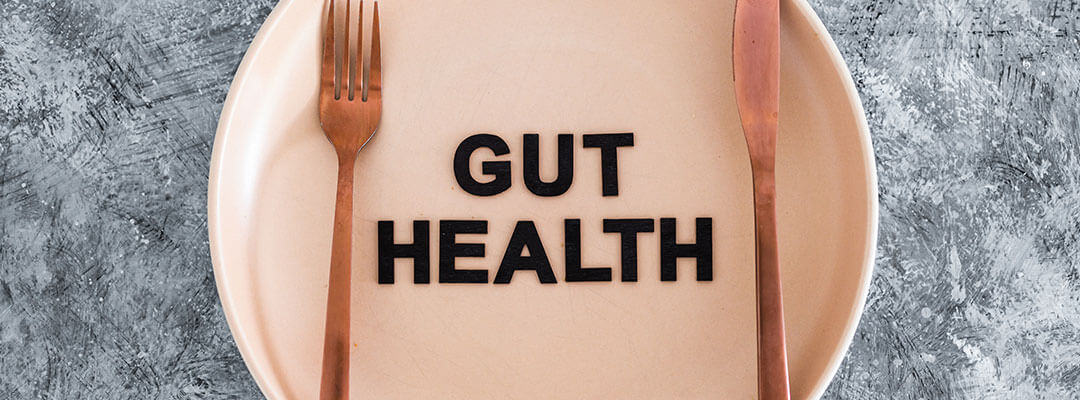The symptoms of SIBO vs. IBS are similar, but turns out there’s a pretty easy and straightforward way to delineate between the two conditions. When something is going on in your gut, you want to get to the root of it and fix it STAT. Belly woes are not just annoying, they can be downright debilitatingly painful and interfere with your everyday life.
So what is the difference between the symptoms of SIBO vs. IBS? Before we dive into that, let’s first explore what exactly SIBO is and what IBS encompasses. As well as how both conditions are typically defined and treated. Then we can get to the bottom of your belly woes.

What Is SIBO?
SIBO, or small intestinal bacterial overgrowth, occurs when there is an increase in the amount of bacteria in the small intestine, according to the Mayo Clinic.
SIBO is not fully understood in the medical community, but often results from a surgery or disease that slows the passage of food through your digestive tract, allowing the bacteria to overpopulate. Potential causes of SIBO include:
- Abnormalities in your digestive tract anatomy
- pH changes in your bowel
- Immune system issues
- Intestinal dysmotility, meaning food and bacteria are not moving through the digestive system properly
- Low stomach acid
Symptoms of SIBO and Common Treatments
The most common symptoms of SIBO occur in the gut and cause stomach issues. These include:
- Abdominal bloating
- Abdominal cramping
- Nausea
- Diarrhea
- Constipation
- Uncomfortable fullness after consuming food
- Unintentional weight loss
- Malnutrition
- Indigestion
- Gas
SIBO is typically diagnosed with a physical exam and a hydrogen breath test, or methane-based breathing test. The bacterial overgrowth in the small intestine releases methane gas and hydrogen. Both can be detected after drinking a special sugary drink and breathing into a tube over the course of a few hours.
Treatment of SIBO involves antibiotics to mitigate the bacterial growth. Once under control, your physician will seek to identify the root cause of the bacterial overgrowth. Dietary changes are often an important line of defense. Consuming smaller meals throughout the day and eating a balanced diet is important. As is avoiding gluten to protect your gut lining if you are sensitive or have Celiac disease.
What Is IBS?
An IBS (irritable bowel syndrome) diagnosis usually results from a handful of bothersome IBS symptoms that arise in your gastrointestinal tract—which consists of your stomach, small intestine, and large intestine. IBS is used as an umbrella diagnosis when the exact cause of your gastrointestinal symptoms cannot be pinpointed.
Symptoms of IBS and Common Treatments
Most people with IBS experience:
- Recurrent abdominal pain
- Abdominal cramping
- Excessive gas
- Abdominal bloating
- Abdominal swelling
- Mucus in their stool (typically whitish)
- Altered bowel habits
IBS can be classified as either constipation-predominant IBS or diarrhea-predominant IBS. Many people alternate between bouts of the two. A third type of IBS called “post-infectious IBS” occurs after a gastrointestinal infection, such as food poisoning, and is often temporary.
Treatment options for IBS typically involve dietary changes, as well as increasing activity levels. Supplementation or prescription medication may also be suggested. Eating more fruits and vegetables, and other high-fiber foods is a common recommendation to soothe symptoms of IBS. Increasing water intake and avoiding caffeine are also helpful.
Dairy is often suggested to be excluded from your diet as many people with IBS have lactose intolerance.
A low-FODMAP diet is usually explored as well. FODMAP stands for fermentable oligosaccharides, disaccharides, monosaccharides and polyols, a group of carbohydrates. Identifying and eliminating any possible triggers in this carb category, such as onions and garlic, may help alleviate any symptoms.
Increasing exercise and movement helps with IBS symptoms, as does incorporating relaxation techniques. Both may normalize bowel movements by increasing intestinal motility, helping food move through your system. Avoiding nicotine and eating smaller meals throughout the day are also recommended by physicians.
Sometimes antidepressants or fiber supplements are prescribed, as well as probiotics to aid with gut flora, per The Cleveland Clinic.
IBS is often confused with IBD, or inflammatory bowel disease. Both affect the intestines, but IBD refers to only intestinal inflammation. As opposed to IBS, which refers to the group of symptoms associated with irritable bowel syndrome patients.
Symptoms of SIBO vs IBS
The main difference between SIBO and IBS is that SIBO occurs solely in the small intestine, whereas IBS affects your digestive tract.
While the two gut disorders and digestive diseases differ in this way, there is an overlap in their symptoms. This can make it confusing to decipher what may be going on in your body. The symptoms SIBO and IBS share are:
- Abdominal bloating
- Abdominal pain
- Diarrhea
- Constipation
- Gas
The defining distinction between the two is that if your doctor provides a SIBO diagnosis, it’s safe to say the cause of your IBS symptoms have been identified as bacterial overgrowth in your small intestine. In other words, SIBO is the underlying cause of most of your IBS symptoms, according to Very Well Health.
You can have SIBO without having IBS, but doctors believe SIBO is usually the culprit behind IBS symptoms. With successful treatment of the SIBO and identification of the root cause of the small intestine bacterial overgrowth, your IBS symptoms should subside as well.
When SIBO is present with your IBS, there are distinguishing additional symptoms:
- Gas and bloating soon after eating
- Distension of your abdomen that worsens as the day goes on
- Possible malnutrition
- Unintentional weight loss
- Relief from symptoms with antibiotic usage
Summary
While much is still unknown about the symptoms of SIBO vs IBS, working with a medical professional to identify the root cause and decipher between the two conditions is the first step to getting your gut microbiome back on track.
Stomach issues and digestive disturbances can be debilitating, especially in severe cases, and can interfere with your day-to-day quality of life. But, there is no need to suffer. A myPrimalCoach can work with you and your medical provider to help you find some relief. Simple diet and lifestyle changes can help rebalance your gut microbiome and heal any possible leaky gut, banishing your belly woes.

